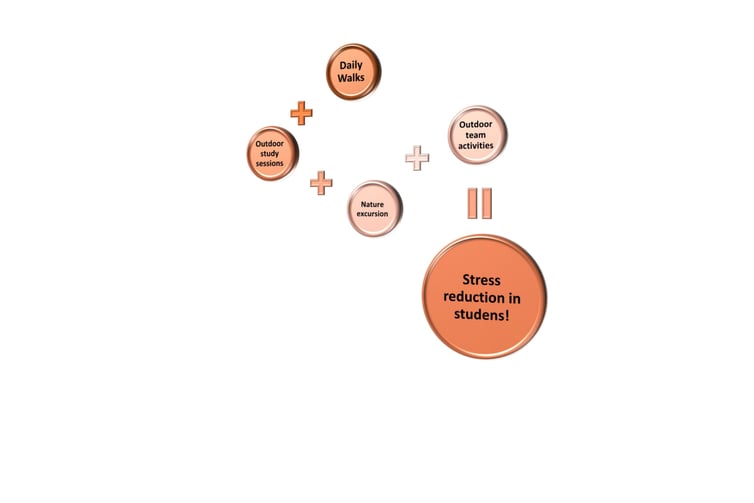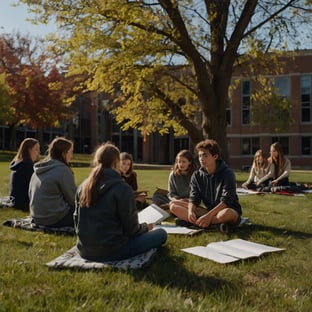How Can Time Spent Outdoors Help Reduce Student Stress?
Feeling overwhelmed by academic pressure? Discover how time spent outdoors can help reduce stress, boost resilience, and improve your academic performance. In this article, we’ll share practical tips and strategies to manage student stress naturally. Step outside, recharge, and thrive—learn how outdoor activities can transform your academic life and overall well-being!
11/15/20246 min read
Student life often brings a significant amount of stress due to the pressures of academic demands, tight deadlines, and the constant need to excel. We know that these pressures can quickly lead to burnout, anxiety, and poor academic performance if they aren't properly managed.
We tried to observe this in our article "Coping with Academic Pressure: Stress Management Tips for Students." It is essential that we, as students, find effective ways to cope with this stress and avoid becoming overwhelmed. Amid these challenges, there is a simple yet powerful solution gaining attention: spending time outdoors.
Outdoor activities not only help alleviate stress but also enhance cognitive function and academic performance, offering a much-needed break from the intensity of daily academic life.
By understanding the many ways nature supports both our mental and physical well-being, we can better navigate the pressures of modern education. Time spent outdoors fosters the development of resilience, as highlighted in "Building Resilience: How Students Can Manage Stress in a Competitive World." Engaging in nature-based activities gives us the space to recharge mentally, physically, and emotionally. These activities not only reduce anxiety and stress but also help us build the mental fortitude needed to handle the challenges of rigorous academic environments. Being in nature allows us to disconnect from academic stress, return to our studies with renewed focus, and approach problems with a clearer mind.
Furthermore, outdoor activities play an important role in helping us develop healthy coping mechanisms for stress, as emphasized in "How Can Students Develop Healthy Coping Mechanisms for Stress?" When we step away from our desks and immerse ourselves in nature, we engage in physical activities that release endorphins, reduce cortisol levels, and help to regulate our emotions. Whether it’s taking a walk in a park, enjoying a hike in the woods, or simply sitting outside to relax, nature provides an effective space for managing overwhelming emotions and preventing stress from building up.
By integrating outdoor activities into our daily routines, we can cultivate better coping strategies, improve our resilience, and ultimately boost our academic performance. These simple yet powerful actions help us strike a healthy balance between academic demands and personal well-being. As we emphasize in our article on stress management techniques, incorporating time outdoors into our schedules isn’t just a break—it’s an essential practice for fostering long-term mental health and academic success. When we regularly step outside and engage with nature, we are actively working toward healthier, more sustainable coping mechanisms that help us not just survive, but thrive in the face of academic challenges.
Ultimately, the importance of time spent outdoors cannot be overstated. Namely, outdoor activities provide long-term benefits. These activities offer us the tools we need to stay balanced, focused, and successful. Nature provides the mental clarity and emotional restoration we need to face our academic responsibilities with confidence. Time outdoors is truly an invaluable tool in combating student stress and enhancing our overall well-being.
How Can Outdoor Activities Reduce Student Stress?
Outdoor activities reduce student stress by promoting mental clarity, improving mood, and providing opportunities for physical activity. All of these contribute to lower stress levels and improved academic focus. These benefits come from exposure to natural environments, which have been shown to lower cortisol levels and foster relaxation.
The Multifaceted Benefits of Outdoor Activities for Students
Outdoor activities offer a wide range of benefits that go beyond stress relief. By addressing multiple aspects of our mental, physical, and emotional well-being, these activities create a holistic impact on our lives.
From enhancing focus and memory to fostering social connections and promoting physical health, time spent outdoors is a powerful antidote to the challenges of academic life.
Here, we explore the various ways outdoor activities can improve our overall quality of life and support our educational journey.


Nature as a Stress Reliever: The Psychological Benefits
Time spent in green spaces has profound psychological effects.
Exposure to nature can improve our psychological resilience by fostering adaptability and emotional stability. Nature’s calming influence helps us regulate emotions, allowing us to face academic pressures with a clearer mind.
Additionally, even short-term exposure to natural settings significantly enhances our cognitive performance by improving attention and working memory. Whether it’s a brief walk between classes or a weekend spent hiking, these activities provide quick and effective stress relief.
Enhanced Cognitive Function for Academic Success
A key finding of the various researches is nature’s role in boosting cognitive function. Green environments allow us to reset our mental focus, improving our ability to retain information and solve complex problems.
This cognitive boost is essential for academic performance, especially during high-pressure times such as exams.
Physical Activity and Stress Reduction
Outdoor activities like walking, running, or engaging in team sports combine the benefits of exercise with the therapeutic effects of nature.
Regular physical activity in outdoor settings improves our stress recovery and reduces overall stress levels.
Physical activity releases endorphins—often referred to as “feel-good” hormones—which naturally combat stress and elevate our mood.


Social Interaction and Emotional Support
The outdoors often serve as a setting for social connection, which is essential for mental well-being.
University students and staff who engaged in outdoor activities during the COVID-19 pandemic reported improved subjective well-being.
These social interactions in natural settings help us feel supported, reducing feelings of isolation and anxiety.


Building Resilience Through Outdoor Learning
Outdoor learning experiences, such as environmental education programs or team-building exercises, are particularly effective in preparing us for academic challenges.
These activities build our psychological resilience and encourage problem-solving skills. When we participate in these programs, we develop confidence and adaptability that translates into better academic performance.
Academic Benefits of Outdoor Activities
The connection between time spent outdoors and academic performance is well-documented.
Students who spent more time outdoors showed marked improvements in their academic outcomes. By alleviating stress and enhancing cognitive function, outdoor activities indirectly support better grades and academic achievements.
Even brief exposure to natural environments improved working memory and attention—both of which are critical for effective studying and learning. This underscores the importance of integrating outdoor time into our daily routines to optimize academic potential.


Why Outdoor Activities Are Essential for Holistic Development
Outdoor activities provide more than just an escape from academic pressures; they play a crucial role in our holistic development.
By engaging in physical, social, and cognitive activities in natural environments, we are better able to balance our mental health, improve academic performance, and build resilience for life’s challenges.
The benefits extend far beyond the immediate stress-relief effects and contribute to our long-term well-being, preparing us for both our academic and personal futures. Let’s explore how these activities support not just our minds, but our bodies and spirits as well.
Physical Health Benefits
Engaging in outdoor activities not only reduces stress but also promotes overall physical health.
Regular movement in natural settings improves cardiovascular health, strengthens immunity, and helps maintain a healthy weight.
These physical benefits contribute to better energy levels and mental clarity, which are crucial for academic success.


Creative Inspiration
Natural environments often inspire creativity, providing a fresh perspective on academic challenges.
Students who regularly spend time outdoors reported higher levels of creative thinking and problem-solving skills.
This is particularly useful in subjects that require innovative approaches, such as writing, design, and research.
A Sustainable Habit for Lifelong Well-Being
Incorporating outdoor time into daily life establishes a sustainable habit that benefits us beyond our academic years.
The positive association between outdoor leisure time and well-being extends into adulthood, making it a lifelong investment in mental and physical health.


Practical Ways to Integrate Outdoor Activities
Incorporating outdoor activities into our daily routines doesn’t have to be complicated. Here are some practical ways we can take advantage of nature’s stress-relieving benefits and improve academic performance.
Daily Walks: Encourage short walks during study breaks or commutes. Even a 10-15 minute walk can provide a refreshing break, reduce stress, and boost cognitive function.
Outdoor Study Sessions: Studying in a park, garden, or any outdoor setting not only offers a change of scenery but also fosters focus and creativity, making it easier to absorb information.
Nature Excursions: Weekend hikes, nature walks, or visits to botanical gardens provide a refreshing escape from academic pressure and help us recharge mentally and physically.
Outdoor Team Activities: Participating in outdoor sports or group activities like soccer or tennis fosters physical health and social connection, reducing stress and promoting emotional well-being.
Conclusion: A Natural Remedy for Student Stress
Spending time outdoors is far more than just an enjoyable pastime—it is a transformative tool that can significantly reduce stress and enhance academic performance.
Nature is not just a backdrop for relaxation, but a critical component in fostering mental well-being, improving focus, and supporting cognitive excellence.
Nature’s ability to lower cortisol levels, boost mood, and refresh the mind makes it a powerful ally in the fight against academic stress. By embracing outdoor activities, we can better handle the pressures of our studies while nurturing our emotional and physical health. Whether it’s taking a walk, studying in a natural setting, or participating in outdoor sports, spending time outdoors significantly improves our quality of life and makes academic challenges seem less daunting.
Incorporating outdoor time into our routines shouldn’t be seen as a luxury or an optional break—it’s an essential aspect of well-being. Encouraging ourselves and others to step outside and reconnect with nature is one of the most effective ways to reduce stress and help us succeed academically. By giving ourselves the opportunity to experience nature, we’re investing in a healthier, more balanced lifestyle that supports not just academic success, but personal growth as well.
Nature offers us simple yet profound solutions to life’s challenges. Sometimes, the best remedy for stress is simply stepping outside, breathing in fresh air, and letting nature do the work. By harnessing the transformative power of outdoor activities, we can cultivate calm, build resilience, and achieve greater academic success, all while deepening our connection to the world around us.


